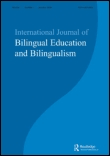
International Journal of Bilingual Education and Bilingualism
Scope & Guideline
Championing research that shapes bilingual futures.
Introduction
Aims and Scopes
- Bilingual Education Policies and Practices:
The journal examines diverse bilingual education policies and their impacts on educational practices, exploring how these policies shape the experiences of students and educators in various linguistic contexts. - Translanguaging as Pedagogy:
A significant focus is placed on translanguaging practices, emphasizing how educators can integrate multilingual resources in teaching to support bilingual learners' cognitive and social development. - Cognitive and Linguistic Development:
Research articles often investigate the cognitive benefits of bilingualism, including executive function and literacy development, providing insights into how bilingual experiences shape linguistic abilities. - Cultural and Identity Dimensions:
The journal explores the intersection of language, culture, and identity, highlighting how bilingual education can foster cultural awareness and support the identity development of bilingual learners. - Inclusive Practices for Emergent Bilinguals:
There is a strong emphasis on inclusive education practices that support emergent bilinguals, including strategies for addressing diverse learning needs and promoting equity in educational settings. - Teacher Education and Professional Development:
The journal addresses the preparation and ongoing professional development of educators working in bilingual contexts, focusing on effective pedagogical strategies and reflective practices. - Community and Family Engagement:
Articles often explore the role of families and communities in supporting bilingual education, examining how home language practices influence children's bilingual development.
Trending and Emerging
- Translanguaging and Multilingual Pedagogies:
There is a significant increase in research focused on translanguaging as a pedagogical approach, highlighting how fluid language practices can enhance learning outcomes for bilingual students. - Impact of Socioeconomic Factors on Bilingual Education:
Emerging studies are increasingly addressing the intersection of socioeconomic status and bilingual education, exploring how these factors influence academic performance and language development. - Culturally Sustaining Pedagogy:
A trend towards culturally sustaining pedagogy is evident, with a focus on how educational practices can honor and sustain the cultural identities of bilingual learners. - Digital and Online Learning Environments:
Research is expanding to include the effects of digital learning environments on bilingual education, particularly in the context of the COVID-19 pandemic and the rise of online teaching. - Teacher Collaboration and Professional Learning Communities:
An emerging theme is the collaboration among educators within professional learning communities, focusing on shared practices and strategies to support bilingual learners. - Intersectionality in Bilingual Education:
Research is increasingly exploring the intersectionality of language, identity, and culture within bilingual education, examining how these dimensions interact to shape learners' experiences. - Bilingualism and Mental Health:
An emerging focus on the relationship between bilingualism and mental health is evident, with studies investigating how bilingual education can support emotional and psychological well-being among learners.
Declining or Waning
- Traditional Bilingual Education Models:
There has been a noticeable decline in research focused on conventional bilingual education models, such as transitional bilingual education, as newer models like dual language programs and translanguaging gain prominence. - Monolingual Ideologies in Education:
Discussions surrounding monolingual ideologies and their critiques seem to be less frequent, as the journal increasingly shifts focus towards more inclusive and plurilingual approaches to education. - Static Language Assessment Methods:
The journal has moved away from traditional static assessments of language proficiency, indicating a decline in interest towards more dynamic and context-sensitive assessment practices that reflect bilingual learners' actual competencies. - Homogenized Language Practices:
Research that emphasizes homogenized language practices in bilingual education is waning, as there is a growing recognition of the need for differentiated and contextually relevant approaches to bilingual teaching.
Similar Journals
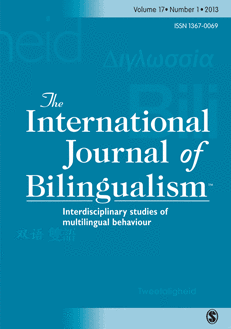
International Journal of Bilingualism
Navigating the complexities of bilingual education.The International Journal of Bilingualism, published by SAGE Publications Ltd, stands as a distinguished forum within the fields of Education and Linguistics, boasting an impressive Q1 ranking in both categories as of 2023. Since its inception in 1997, this journal has been at the forefront of bilingualism research, contributing to a deeper understanding of language use, acquisition, and policy in multilingual contexts. With its ISSN of 1367-0069 and E-ISSN 1756-6878, the journal serves a global audience of researchers, educators, and students dedicated to advancing knowledge in bilingualism. The journal is recognized for its rigorous peer-review process and high impact, indicated by its Scopus rankings, which place it in the top percentile among its peers. Although currently not offered as open access, the International Journal of Bilingualism remains an essential resource for cutting-edge research and dialogue in the dynamic field of bilingual studies, thereby significantly impacting educational practices and language policy decisions worldwide.
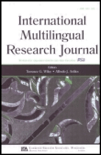
International Multilingual Research Journal
Championing rigorous research in education and linguistics.The International Multilingual Research Journal, published by Routledge Journals, Taylor & Francis Ltd, is a leading platform for the dissemination of innovative research in the fields of Education and Linguistics. With an impact factor reflecting its rigorous academic standards and a Q1 ranking in both relevant categories, this journal is dedicated to advancing the understanding of multilingualism and its implications globally. It serves as an essential resource for researchers, educators, and practitioners who seek to explore the complexities of language and learning across diverse cultural contexts. Since its inception in 2010, the journal has converged a wealth of scholarly articles that address contemporary issues in language use and pedagogical practices. The journal adheres to the highest research integrity standards and promotes open dialogue among scholars, making it a vital tool for those engaged in this expanding field. With its strong positioning in prestigious databases like Scopus, the International Multilingual Research Journal is committed to enriching the academic community and fostering interdisciplinary collaborations.
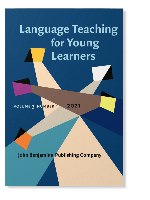
Language Teaching for Young Learners
Advancing research to nurture language skills in children.Language Teaching for Young Learners, published by John Benjamins Publishing Co, is a premier journal dedicated to enhancing the pedagogy of language acquisition in early childhood education. Since its inception in 2019, it has rapidly established itself within the research community, reflected by its high Scopus rankings—placing it in the 85th percentile for Language and Linguistics and the 84th percentile for Education. The journal aims to provide a platform for innovative research, practical insights, and theoretical discussions surrounding the teaching of languages to young learners, thus contributing significantly to the fields of Education and Linguistics. With an open access model currently unavailable, it caters to a diverse global audience, including researchers, educators, and policy-makers, keen on improving pedagogical practices. Located in the Netherlands, the journal's commitment to academic excellence is evident through its Q1 and Q2 rankings in Linguistics and Language and Education respectively, encouraging continual discourse in cultivating effective language education practices.
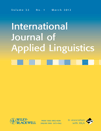
International Journal of Applied Linguistics
Fostering Innovation in Language StudiesInternational Journal of Applied Linguistics, published by WILEY, is a premier platform for cutting-edge research in the field of applied linguistics. With a notable Impact Factor and ranked in the top Q1 quartile of linguistics and language, this journal serves as an essential resource for scholars, practitioners, and students. The journal’s wide-ranging scope includes various subfields such as language acquisition, language education, sociolinguistics, and discourse analysis, fostering multidisciplinary approaches to language studies. It has achieved a significant Scopus Rank, placing it in the 90th percentile for both Arts and Humanities as well as Social Sciences categories, reflecting its high visibility and influence in the academic community. The International Journal of Applied Linguistics is committed to advancing the understanding of language use in real-world contexts through rigorously peer-reviewed articles that contribute to both theory and practical applications. While it is not an open-access journal, it remains a highly respected publication for researchers looking to disseminate and acquire knowledge in applied linguistics.

Revista Peruana de Investigacion Educativa
Connecting Scholars and Practitioners for Educational ExcellenceRevista Peruana de Investigacion Educativa is a distinguished academic journal published by the SOC INVESTIGACION EDUCATIVA PERUANA, dedicated to advancing knowledge within the field of educational research. With its ISSN 2076-6300 and E-ISSN 2077-4168, this peer-reviewed journal aims to provide a platform for scholars, educators, and practitioners to disseminate innovative research findings, theoretical advancements, and critical reviews related to educational practices in Peru and beyond. Although the journal currently operates without an open-access model, its commitment to quality and relevance is reflected in its rigorous editorial standards. By fostering dialogue on pivotal educational issues, Revista Peruana de Investigacion Educativa plays an important role in enhancing educational outcomes and shaping policy decisions, making it an essential resource for researchers, professionals, and students interested in the dynamics of education in the Latin American context.

Language and Cognition
Bridging Language and Cognitive ScienceLanguage and Cognition is a premier peer-reviewed journal published by Cambridge University Press, dedicated to advancing the fields of language, linguistics, and cognitive psychology. With an ISSN of 1866-9808 and E-ISSN of 1866-9859, it has rapidly established itself as a pivotal resource for researchers, educators, and practitioners alike. Recognized for its rigorous scholarship, the journal holds a Q1 ranking in Linguistics and Language and a Q2 ranking in Experimental and Cognitive Psychology for 2023, reflecting its esteemed positioning within the academic community. Since transitioning to open access in 2023, it has broadened its reach, making cutting-edge research accessible to a global audience. The journal's emphasis on interdisciplinary studies ensures a comprehensive exploration of the interactions between language and cognitive processes, fostering deeper insights and fostering collaboration across domains. Researchers and professionals looking to stay at the forefront of advancements in these vital areas will find Language and Cognition an invaluable platform for disseminating their findings and engaging with contemporary debates.
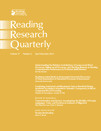
READING RESEARCH QUARTERLY
Exploring the depths of reading comprehension.READING RESEARCH QUARTERLY is a premier academic journal dedicated to advancing the understanding of reading research within the domains of educational psychology and literacy development. Published by Wiley, this journal has been a vital resource for researchers, educators, and practitioners, featuring empirical studies, theoretical papers, and comprehensive reviews since its inception. With a remarkable impact factor and consistently ranked in the Q1 quartile for both Developmental and Educational Psychology and Education, it stands out as an authoritative source in the field. Notably, it possesses a strong international presence, evidenced by its Scopus rankings, sitting in the top 3% for educational social sciences and within the top 5% for developmental psychology. Although currently not offering Open Access, the journal ensures that its contributions are accessible through institutional subscriptions. By linking theoretical frameworks with practical applications, READING RESEARCH QUARTERLY serves as an essential platform for fostering innovation and collaboration among scholars and practitioners aiming to enhance literacy education and understanding.

ELIA-Estudios de Linguistica Inglesa Aplicada
Transforming Linguistic Knowledge: Open Access for Global ScholarsELIA-Estudios de Linguistica Inglesa Aplicada, published by the University of Sevilla, Faculty of Philology, is an esteemed open-access journal that has been a cornerstone in the field of English Linguistics since its establishment in 2000. With an ISSN of 1576-5059 and an E-ISSN of 2253-8283, ELIA aims to foster scholarly research and discourse by providing a platform for innovative studies in linguistics and applied language studies. As a testament to its academic rigor, the journal has achieved a Q2 ranking in Linguistics and Language for 2023, reflecting its impact and relevance within the academic community. The journal is indexed in Scopus, further solidifying its standing with ranks in both the Arts and Humanities and Social Sciences categories. Researchers, professionals, and students alike will find valuable insights and research findings that contribute to the evolving understanding of English linguistics. The journal is based in Sevilla, Spain, and can be accessed freely online, making it an accessible resource for those engaged in the study of language and linguistics.

AMERICAN ANNALS OF THE DEAF
Advancing Knowledge in Deaf Education and CommunicationAMERICAN ANNALS OF THE DEAF, published by Gallaudet University Press, stands as a pivotal scholarly resource within the fields of Developmental and Educational Psychology, Education, and Speech and Hearing. With a commitment to advancing research and discourse surrounding deafness, the journal has been a cornerstone in the field since its inception in 1946. Recognized with a 2023 Q3 category quartile ranking across multiple disciplines, it continues to make significant contributions to knowledge and understanding in the deaf community and related educational practices. While currently not offering an Open Access model, AMERICAN ANNALS OF THE DEAF remains vital for those seeking to explore the complexities of deaf education and communication, making it a valuable asset for researchers, practitioners, and students alike.
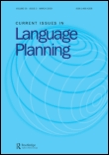
Current Issues in Language Planning
Charting New Territories in Language Planning StudiesCurrent Issues in Language Planning is a prestigious academic journal published by Routledge Journals, Taylor & Francis Ltd, focusing on the critical study of language planning and policy. Established in 2008 and converging until 2024, this journal plays a pivotal role in the field of linguistics and education, as evidenced by its impressive Q1 rankings in both Education and Linguistics and Language categories. With a robust Scopus ranking, placing it in the 94th percentile for Arts and Humanities and Social Sciences, it offers a highly respected platform for researchers and professionals to share innovative ideas and findings. Although it is not an open access journal, it provides valuable insights into current debates and developments in language theory and planning, making it indispensable for scholars and students dedicated to advancing their expertise in these vital areas. The journal's contributions are essential for understanding the intricate relationship between language, society, and education policy.